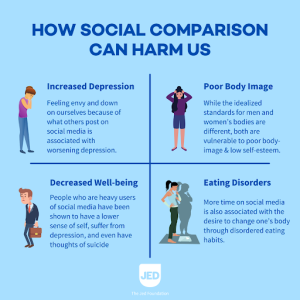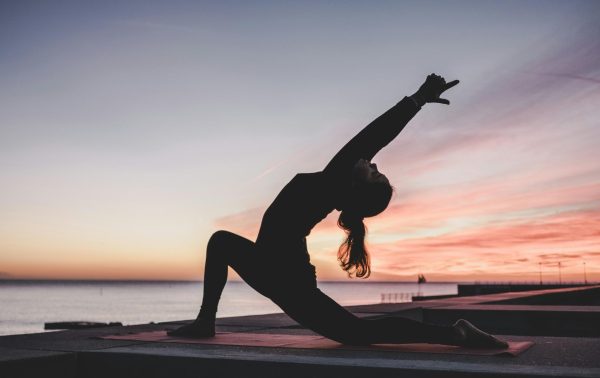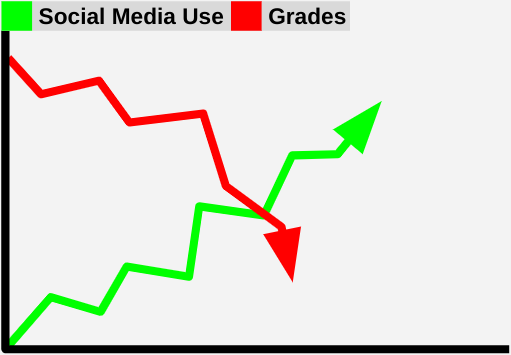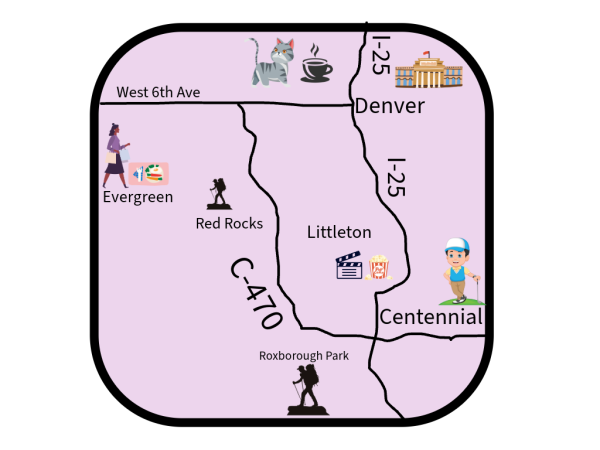Avoid Social Media Comparisons to Maintain a Healthy Outlook

Some previous “it” girls have included Jennifer Aniston, Gigi Hadid, the Kardashians, Hailey Bieber, and Ariana Grande. This goes as far back as Marilyn Monroe. Currently, TikTok makes average girls famous for their looks and lifestyle, including Charli D’Amelio and the new and most popular, Alix Earle.
January 22, 2023
Through the influence of social media, influencers around the world have been named “it” girls, leaving others who want to be noticed as well in a dark hole of comparison. Social media has a huge impact on teens, especially on how they view themselves, so when social media decides to put a new girl on a pedestal because of her looks, it begins to affect the mental health of others.
Dove exemplifies this in their recent commercial, Selfie Talk, showing how teens can easily be affected by social media by creating a need for users to convert their faces to essentially be “prettier” than they already are. Social media brings pressure onto many young children, while also building up others to turn them “it” girls.
The term “it girl” has come to mean some cross of a new, young, generally hot thing known for attending parties and movie premieres and a new, young, generally hot thing who makes her name in a sphere (politics, journalism, golf, rap) broadly delimited to men,” according to Anne Helen Petersen, writer for BuzzFeed.
These girls have become the faces of many products and social media pages by becoming models for various items. While seeing those faces everywhere, many teen girls will begin to compare themselves to those people – wondering why they can’t be just like them.
For example, when some users see what the latest “it” girl Alix Earle is doing, they say to themselves, if Alix does it, I do it. Many teen girls are changing their own lives into the “it girl” lifestyle and removing things that actually make them happy.
But “it girls” only last for an average of two years. If you aim to match their lifestyle completely, chances are they won’t be “famous” like they were when you wanted to be them so bad. As they are just ordinary people, there is no reason to try to change yourself to be like them. If you just focus on yourself, then chances are you’ll end up happier than you’d be if you were exactly like someone else.
With social media, it is important to be authentic to who you are. If you continually try to copy other people’s lives on social media, then you will soon lose your own sense of identity. While having someone to look up to can be amusing, it’s important to remember that they are just ordinary people like we are, especially when considering girls like Alix Earle and Charli D’Amelio. They both came from public school and lived basic lives, just like us.

Therefore, there is no justification for criticizing and comparing your way of living to the lives of those who have come from the same place you are in. We are all regular people who go to school and have families, so constantly mirroring others does not define who you are as a person.
Since social media is a big part of society today, it strongly affects the views girls have of themselves. According to The Jed Foundation, “As social media sites update, they become more interactive and more “addicting,” and the opportunity for social comparison increases. This also increases the negative outcomes of self comparison: depression, anxiety, poor self-esteem, poor body image, and disordered eating.”
Social media increases many mental health problems in today’s teens. Canceling out social media all together is almost impossible, but there can be ways to avoid the mental sacrifices it brings. It’s important to remember that most posts on social media have filters and airbrushed qualities that distort some users’ faces to essentially look prettier.
In a Psychology Today article, “How to Stop Comparing Yourself to Others,” by Susan Biali Haas, Haas offers advice about making comparisons: “Stop falling prey to its dark underbelly, which does little more than increase feelings of misery and lack in your life. Use comparison, instead, to become a better person and maybe even make your little corner of the world a better place.”












